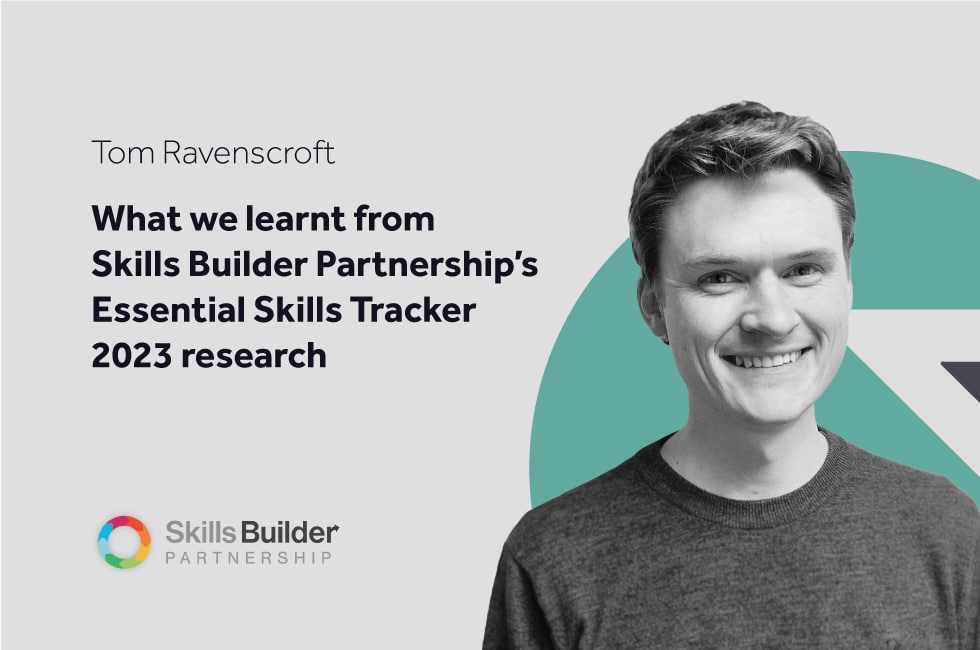Tom Ravenscroft, FED Ambassador and Founder and CEO of the Skills Builder Partnership, shares their recent findings titled ‘What we learnt from Skills Builder Partnership’s Essential Skills Tracker 2023 research’. New findings in the Essential Skills Tracker 2023 from Skills Builder, in partnership with CIPD, Edge Foundation and KPMG, reveals that essential skills are a missing piece in the UK’s productivity puzzle.
This is the second paper in the Essential Skills Tracker annual research series, assessing the state of the UK’s essential skills through a nationally representative sample of the working age population, administered by YouGov.
New findings in the Essential Skills Tracker 2023 from Skills Builder, in partnership with CIPD, Edge Foundation and KPMG, reveals that essential skills are a missing piece in the UK’s productivity puzzle.
This is the second paper in the Essential Skills Tracker annual research series, assessing the state of the UK’s essential skills through a nationally representative sample of the working age population, administered by YouGov.
Why this research now?
The annual Essential Skills Tracker is the first of its kind to use the Skills Builder Universal Framework for Essential Skills. These eight essential skills are those highly transferable skills that everyone needs to do almost any job: listening and speaking; creativity and problem solving; aiming high and staying positive; and teamwork and leadership.
The importance of these skills seems to be talked about endlessly in employer surveys, reviews of educational priorities, and more speculative forward-looking reports. But the absence of shared language and measurable outcomes has to date limited tangible and consistent research into who benefits from these skills and the impact of having them. The Skills Builder Universal Framework addresses this gap.
The value of essential skills
The research makes clear the value of essential skills to individuals, with 92% of people placing higher value on them than any other skill or knowledge area. For parents, 61% view a school’s provision of skills building opportunities as an important factor when choosing a school for their child, and this number rises to 73% amongst parents with a high skill score.
When skills are broken down into the three skill areas – basic, essential and technical – the research shows that essential skills are critical to realising a complete skills portfolio. In other words, there are compelling indications that individuals are only able to leverage their basic skills, qualifications, or experience when they also have an adequate level of essential skills.
Key headlines from the research
13% of the population that experience real social mobility have a complete skills portfolio
Full-time workers in the UK broadly fit into five groups ranging from ‘Skills Trap Proper’ to ‘Middle Class Achievers’. The 13% of the population that experience real social mobility (enjoying strong income, job satisfaction and life satisfaction) have a portfolio of good essential skills, literacy, numeracy and education, despite having had fewer advantages.

A ‘good’ education?
An ostensibly ‘good education’ that builds literacy and numeracy but omits essential skills leaves 18% of workers with above average education level, literacy, and numeracy, and yet a very low essential skill score. This group has the worst job satisfaction, life satisfaction, and sense of their life being worthwhile. They also earn much less than their peers.

In contrast, we learn through the Tracker research that a lower education level is associated with much better life outcomes when respondents report high levels of essential skills.

Access to a wage premium of up to £4,600 a year
Those with higher levels of essential skills earn significantly more than their peers. Moving from the lower quartile to the upper quartile essential skill score is associated with a wage premium of up to £4,600 each year for the average worker.
Employers can have a significant impact on lifelong learning
Although essential skill levels appear to drop-off after the age of 40 in the adult population, opportunities to build essential skills in work completely neutralise this effect. With the chance, these individuals continue to improve their essential skills and benefit from lifelong learning.

Essential skills predict job satisfaction as strongly as income
Skill scores are very strongly associated with job satisfaction. The research found that a 2 step increase in essential skill score on the Universal Framework was associated with the same increase in job satisfaction as up to an additional £55,000 in pay.

For educators
Given the far ranging impact of essential skill levels, we simply can’t afford to leave to chance who benefits from building them in education and who doesn’t. There continues to be a vast difference in opportunities in education, with 40% of respondents receiving no opportunities to build essential skills at school.
When we’re seeing the demonstrable impact that a complete skills portfolio has on an individual – it’s hard to explain why we don’t yet have a fully accepted systematic approach to building essential skills consistently, as we do for numeracy or literacy.

For those who want their students to achieve improved earnings, life satisfaction and social mobility, then taking a holistic approach to building their skills in education should be a primary goal.
What next?
The potential is clear: providing high-quality opportunities to build essential skills in employment and education is life changing – directly linked to higher skill levels and improved outcomes. The Essential Skills Tracker recommends two things that educators can do:
- Take a consistent approach to building essential skills with the same sort of rigour that’s expected in other subjects
- Deliver high-quality opportunities to build essential skills through focusing tightly on the specific steps of each essential skill
The Skills Builder Framework is already used to some extent in 87% of English secondary schools and colleges, with many of those achieving excellence in building their students’ essential skills. But it’s evident that there are many missing out on the chance to reach their potential. That’s why Skills Builder has a clear mission: to ensure that one day, everyone builds the essential skills to succeed.
The partnership is ever-growing, together with more than 850 employers, educators and impact organisations. If you’re a school or college within, or outside, the UK interested in becoming a partner, you can find out whether you’re eligible for a funded place on the Skills Builder Partnership’s education Accelerator programme for 2023-24. This helps educators make a strong start and rapid initial progress in embedding the Skills Builder approach.
Contact Skills Builder: You can get in touch with the Skills Builder Partnership via their website or on social media. The full Tracker report is also available on the Skills Builder website.



